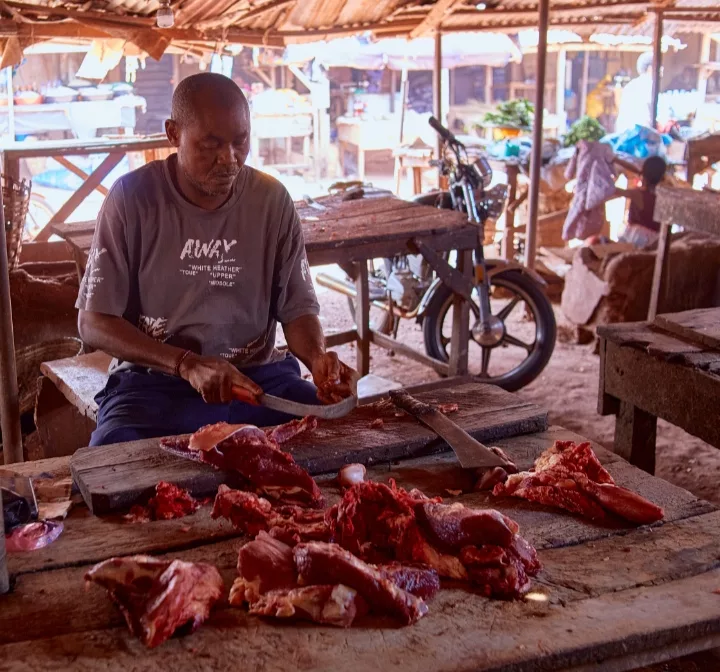By Chetanne Chinelo
The Nkanu people pride themselves with being known with many things, one of which is the trade of killing and retailing meat – Igbuánụ́.
A particular story has it that the word “Nkanu” was coined from the phrase “Nka anu du” meaning “The place with abundance of meat”. Although some persons disagree with this version, Pacesetter made a stop, in preparation for the 2023 Nkanu Today column, at the home of Chief Sunday Nwafor Alias Umunnanwezueaku from Ameke Amigbo, Ozalla, Nkanu West Local Government Area of Enugu State.
Chief Sunday is a renowned but retired merchant in the trade of Igbuánụ́. Telling his story, he says he once slaughtered ten cows in a day.
The concept of Igbuánụ́ begins from purchasing the cow to taking it to slaughterhouse, killing, sharing, and retailing the parts nicely. It is more encompassing and involving than the mere killing of a cow. Although our train couldn’t make it to the slaughterhouse, we got to the Afor-agu market in Ozalla (Four corners) where meats were retailed to consumers.
On what Igbuánụ́ entails, hear Chief Sunday Nwafor:
“Igbuánụ́ is one means of quick wealth. So many of our people who didn’t go to school was as a result of the influence of the wealth made from Igbuánụ́. Our people didn’t initially believe in the benefits of education so, a lot of the Nkanu people joined the trade. The Hausas who owned the cows then trusted us as long as you were honest. We served them before penetrating the business.
“The trade was common among the people of Obe, Ozalla, Amurri, Akpugo, Agbani and Akegbe Ugwu. Our people were drawn to the business of coal and Igbuánụ́. These two trades made our people really wealthy. We traveled as far as Warri, Port-Harcourt, Onitsha, Abakaliki, etc. to ply our trade.
“To commence the trade, you will have to begin by serving someone (Igba boyi). You can’t just jump into the trade. From there, after a while, you can then be on your own. The meat isn’t sourced from hunting, you must buy the cow. You have to learn the names of the different parts of the cow in Hausa language, how to cut each part into its appropriate size and other secrets of the trade, because if you don’t cut the meat properly, you will lose your money. There are ways you will cut the meat and it will shrink in size. The Hausa language is an essential aspect of the trade.
“Those who practiced Igbuánụ́ were feared throughout Nkanu because some of them, most of the time, appeared to be diabolic. This was one of the reasons the trade wasn’t open to everyone. Unfortunately, things have degenerated so badly that even women now practice the trade. Initially, if you were not from Nkanu and practiced the trade, we will show you John Igweshi (Laughs). No matter how wealthy you are, you cannot just venture into the trade like that, No!
“If any of our youths look to joining the trade in this age, it must be digitalised, not doing it the usual way. One of the improvements must be to maintain a very high sanitary standard because usually, anyone in the trade smells a lot.
“I, Oko Nwoko, Samuel Agu, Alhaji Nwokafor Nweke, Chief Emmanuel Okorie-Ani, the Agu-Ude family were some of those who really profiteered from the trade. The irony is that today, it appears that most of those who still practice the trade of Igbuánụ́ are not successful. After I saw the way things changed in the trade, I decided to stop the trade. I wouldn’t advise anyone to practice Igbuánụ́ or involve the children in the practice of the trade. Most of those who made huge profits in those days but never invested the profits are nowhere to be found today. Education is the way forward today”.
Inset: We saw a storey building in Umuokorouba, Ozalla, situated at the center of the market, constructed by Chief Emmanuel Okorie-ani in 1947 using the proceeds from Igbuánụ́.
